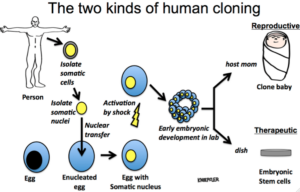The People vs. Reproductive Cloning

Image of a group of identical men with a barcode on their forehead. Royalty-free vector provided by Zdenek Sasek.
There is distrust towards the medical and science field. The reasons for this wariness are many, but it boils down to people questioning the extent of the practices allowed in the name of medicine for advancements. Communities of people have spoken out about the ethical problems they have faced personally and how the actions have affected them and made them view medical practitioners differently. Due to this, we have a wave of people that oppose some of the practices done under medicine, and reproductive cloning is not exempt.

This image shows the difference between reproductive and therapeutic cloning.
As told by a book on the scientific and medical aspects of human reproductive cloning. Reproductive cloning is described as a medical procedure done on purpose to create people with the same genetics. A clone is classified as a copy of an original. An example we are familiar with is identical twins produced the natural way. Cloning is a technique done on both animals and humans. The procedure is more common in animals due to the benefits we gain from it. In livestock, we use sexual reproduction to replicate qualities we want from the animals. It is to achieve higher production of goods. And today, we have people that wish to do the same for personal reasons. It ranges from couples who can’t have children the natural way to people who need transplants to treat diseases from the said clone. Though, we have issues arising from this medical procedure opposed by many who see faults in it.

Image shows medical procedure cloning dead animals for pet owners, bioethical issues raised.
Many people have beliefs as to why they oppose reproductive cloning. Major concerns fall under people’s view on cloning as an unsafe procedure. Evidence from animal cloning has shown risks of reduced life span, genetic mutations, and malignancy (cancerous cells). Genetic mutation is a change in one gene(s) that can lead to illnesses. (Savulescu, 2005). Though it is debated that risks should not stop cloning since the same could happen with natural pregnancies. Another moral dilemma people have against reproductive cloning is that it is an insult to human pride. Many argue that people understand cloning as a contradiction to being a human. They view it as unnatural and an insult to the essence of what makes us beings. (Strong, 2005). These are philosophical beliefs commonly tied under religion. But science disagrees with this notion. The science field is not supernatural and does not follow its ethical practices but its non-religious values. It opposes such arguments that human life has an essence to it. Genetic makeup should not determine people’s worth. Humans are not byproducts regardless of their creation.
On the extreme side of reasoning, people view reproductive cloning as eugenics. Eugenics is the practice or promotion of controlled selective breeding of human populations to improve the population’s genetic makeup. It is associated with genocide, racism, and ableism (discrimination towards people with disabilities). Savulescu’s ethics of cloning indicate that many people believe that human replication occurs with the intent of favoring genetic traits considered desirable, as done with animals. In a published new york times article by a science columnist, he gave an example where a Nebraska congressman, Jeff Fortenberry, at a hearing in 2014, declared that “It is a macabre form of eugenic human cloning,” (Zimmer, 2018). These opinions are not just held by average civilians but also by people in authority. Those in the medical field disagree and state that there are other forms to practice such harmful ideas without cloning. Human replication is restricted to cases where it is required. The purpose of cloning is to provide human life with a long and healthy life span. Despite all the objections, most countries have banned any medical procedure under reproductive cloning. In 2005, 84 countries under the united nations voted to prohibit human cloning because it opposed human safety and dignity. Hungary, United States, Poland, and many others were part of the 84. (United Nations, 2005).

Image of Henrietta Lacks, known for her immortal cells cloned for medical research.
Despite all this, the medical field has yet to address its long history of racism embedded in it. The first human cells to be cloned successfully were the HeLa cells that belonged to Henrietta Lacks. Medical advancement is achieved without the respect or acknowledgment of a Black woman and her family. In a filmed documentary, Henrietta Lacks is a woman whose cancerous cells were collected without her permission before death for research purposes. Despite all the money earned and aid to healing diseases from her immortal cells, her family did not receive a dime, and she was not known to be the stepping stone for medical breakthroughs for years. It highlights how structural racism is in many institutions, and Black people are reduced to their bodies and labor only. They did not spare her any humanity. It is not the only case where racism impacted the treatment of patients that are minorities. In a medical review, minorities reported that they were treated differently and informed poorly about their treatment. The medical providers were less compassionate and assumed negative stereotypes about the patients. (Sim, et al., 2021).
Society has a long way to go before we can reach a middle ground on the practice of reproductive cloning. There are stretches in the bias in people about the topic, but it stems from a lack of understanding and awareness. Scientific knowledge should be accessible for many to have resolutions to the issues they have with reproductive cloning. The concerns the average person has with the topic are valid. Medical practitioners should address the general public if they want to progress. Reproductive cloning can benefit multiple people at hand, but until scientific and non-scientific discuss, we won’t see the end of the issue at hand.


